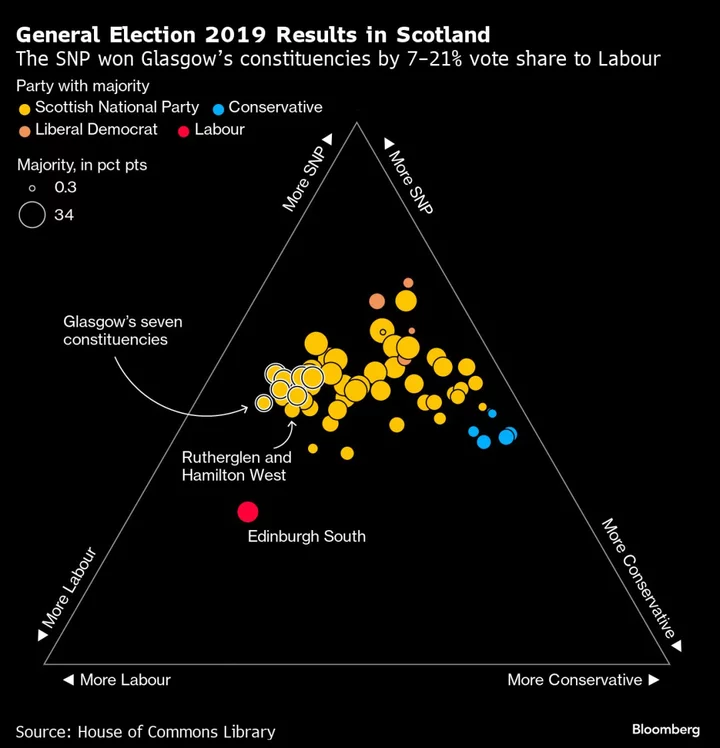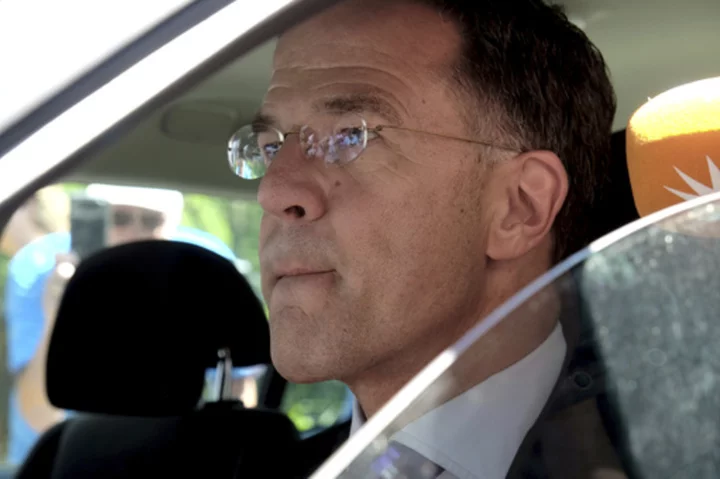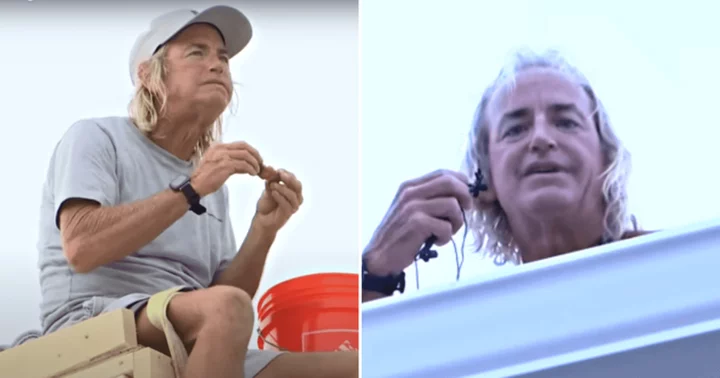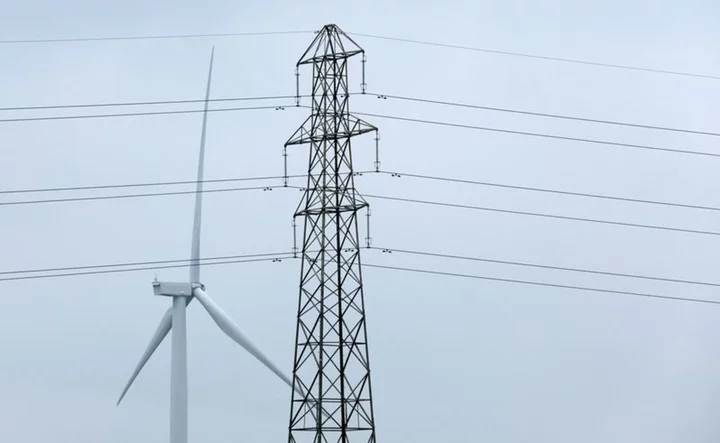The Labour Party won a parliamentary special election in Scotland on a large swing, suggesting leader Keir Starmer is on track to lead the UK’s main opposition to victory in a nationwide vote expected next year.
Labour’s Michael Shanks won 58.6% of the votes in Rutherglen and Hamilton West, southeast of Glasgow, an increase of 24.1 percentage points. He took the district from the Scottish National Party, whose candidate Katy Loudon finished second on 27.6%, down 16.6 points.
The seat has alternated between Labour and the SNP at every vote since 2015 — when the nationalist party ended Labour’s historic dominance across Scotland in general elections. The 20.4-point swing is a major boost for Starmer as he prepares for his party’s annual conference this weekend, bolstering his argument that Labour is on track to win enough seats in Scotland to help him oust Conservative Prime Minister Rishi Sunak from Downing Street in the general election.
“It’s the direction of travel that you cannot ignore in this by-election,” John Curtice, professor of politics at Strathclyde University, told BBC TV. “If this kind of swing were to be replicated across Scotland as a whole, you’ll be talking about the Labour Party quite clearly being the dominant party north of the border again.”
That would be a major turnaround for a party that took just one of the 59 seats in Scotland in the 2019 general election, compared to 48 for the SNP. Labour won 41 of those seats as recently as 2010 but had seen its fortunes wane north of the border as the SNP established a stranglehold. Starmer called the Rutherglen and Hamilton West result “seismic,” saying voters had sent a “clear message” that they wanted “change” from both the Tory central government and the SNP one in Scotland.
“I have always said that winning back the trust of people in Scotland is essential,” Starmer said in a statement. “Tonight’s victory is the culmination of three and a half years of hard work in years of hard work.”
The timing of the special election raised the stakes for Labour, days before the party’s lawmakers and fee-paying members head to the conference in Liverpool, northwest England, on Sunday. Starmer will use the high-profile event to galvanize activists and present himself as the true candidate for change, after Sunak used the Tories’ own gathering this week to try to distance himself from 13 years of Conservative governments that have left his party deeply unpopular.
Read more: Labour’s Hopes of Taking UK Power Could Come Down to This City
Labour leads the Tories by about 20 points in national opinion polls, but the nature of Britain’s first-past-the-post electoral system complicates the link between a party’s broader popularity and the distribution of seats in Parliament. Scotland has always played a key role in Labour’s fortunes and the party’s strategists have set a target of taking about 16 seats next year. Given Rutherglen was one of seven seats Labour won as recently as 2017, a loss would have presented Starmer with a major headache, suggesting he wasn’t on track to make the desired gains.
Bookmakers had made Labour the clear favorite to win, with pollsters viewing the district as typical of the kind of parliamentary seat Labour will have to recover if it’s going to reach its target.
Labour’s optimism in Scotland stems in large part from falling support for the SNP, amid a police investigation into its finances. Rutherglen was also the first major ballot since Nicola Sturgeon, one of the UK’s most popular politicians, stepped down as leader of the SNP and head of Scotland’s semi-autonomous government in March.
Sturgeon’s successor, Humza Yousaf, called it a “disappointing night” for the party, blaming defeat in part on the “collapse” of the Tory vote. The governing party’s candidate, Thomas Kerr, took just 3.9% of the vote, down 11.1 points.
“We lost this seat in 2017, and like 2019 we can win this seat back,” Yousaf said in a post on the social media platform X, formerly Twitter. “However, we will reflect on what we have to do to regain the trust of the people of Rutherglen & Hamilton West.”
The election was also called in unusual circumstances after former SNP lawmaker Margaret Ferrier was removed by her constituents for breaking Covid travel rules. The SNP will likely argue that means the Rutherglen result won’t necessarily translate to other districts next year, especially as backing for Scottish independence – the party’s primary policy – remains largely unchanged, with the nation of 5.4 million roughly split down the middle.
Read more: Scotland’s New Leader Faces Same Old Rancor Over Independence
Still, there are signs Labour’s argument that it represents the best chance of removing the Tories from power is cutting through with voters. Research by consultancy Stonehaven published in the Times newspaper on Monday found the SNP could win 25 Scottish seats in the UK Parliament in the next election, down from 48 in 2019. Labour could win 20 seats in Scotland, up from one.
--With assistance from Jill Disis.
(Updates with comment from Curtice, Starmer, Yousaf, starting in fourth paragraph.)









